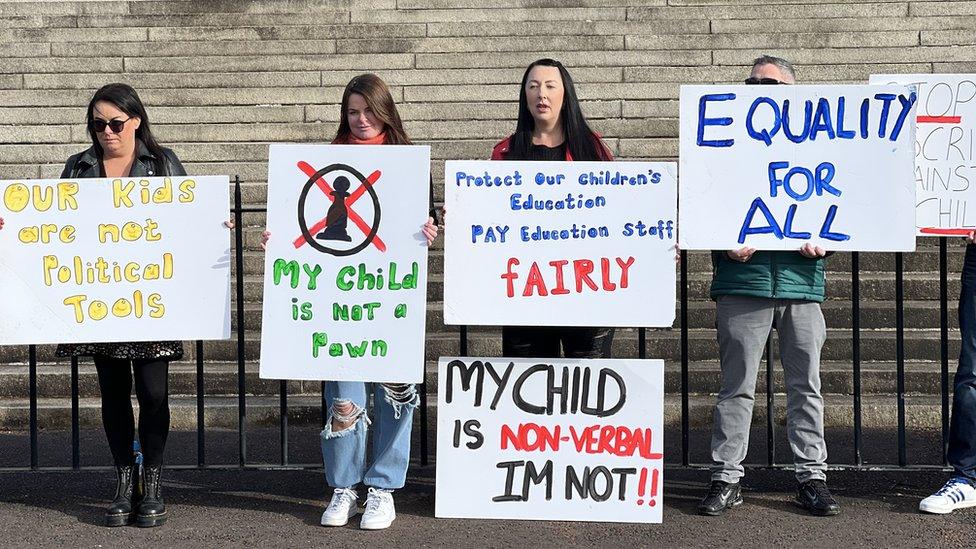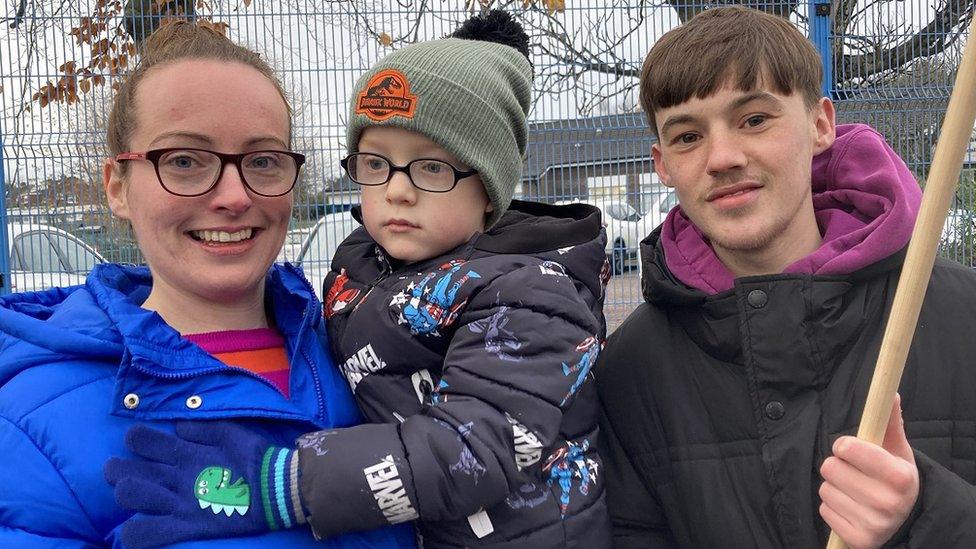SEN school strikes: Boy asks 'Why am I not going to school?'
- Published
Families gather at Stormont to protest over special education funding shortages
Some parents cannot cope with further strikes that disproportionately affect pupils at special schools, the mother of a child with autism has said.
Louise Sadlier's nine-year-old son Fionn is among children who have missed several days of school this academic year because of industrial action.
"Our children's lives are routine-based and these strikes just threw everything up in the air," she told BBC News NI.
She joined a protest on Monday to call for better pay for school workers.
Stormont's Department of Education said the resolution of industrial action was "a priority" for the Education Minister Paul Givan and he had recently met unions to discuss the issue.
Monday's protest outside Stormont was organised by the Colin Autism Advice and Support group, based in west Belfast.
Its aim was to highlight failures in the special educational needs (SEN) sector and their impact on vulnerable pupils and their families, who are left to cope alone on strike days.
"We can't go through any more days off," Ms Sadlier told the BBC's Good Morning Ulster programme.
She explained Fionn is an intelligent boy who noticed that his special school in Lisburn was forced to shut on several occasions, while neighbouring mainstream schools remained open.
"The local mainstream school is at the bottom of the street," she explained.
"So Fionn can then see the other children going to school and he's like: "Why am I not going to school?"
The disruption had a negative impact on her son's behaviour as he found it difficult to cope without regular support from his teachers and school staff.
"Fionn sets timers for everything so when that routine is broken it has a very, very bad effect on him," his mother explained.
"Whenever he's not in school during the week he kicks off and that has an effect on his eating and his sleeping."
Members of the support group have said the ongoing threat of further strike action is having a serious impact on their children's education and their families' livelihoods.

Louise Sadlier and her son Fionn struggled at home during strike days
The organisation supports about 1,000 people in west Belfast.
Over the past few months, teaching unions across Northern Ireland have staged strikes over pay which resulted in intermittent closures for all schools.
But there were additional closures for special schools where educational support staff, including bus drivers, canteen workers and classroom assistants also staged strikes over pay.
Ms Sadlier said pay claims should be settled for staff who look after pupils like her son.
"They are absolute angels and they go above and beyond for our children and they just deserve fair pay," she said.
She added that her message to politicians at Stormont would be: "You get paid, so pay them."
Deborah Maguire, from the Colin Autism Advice and Support group, has a seven-year-old son with severe learning difficulties.
"It's got to the stage that all SEN parents have given up hope," she said.

Parents of children with special educational needs gathered outside Stormont
"Unless this is included in the 2024 budget it won't happen this year and that will mean 12 months of more failure."
Politicians at Stormont will debate a motion from the Alliance Party on Monday which calls for better investment in special needs education.
Pay and grading review delay
The issue was discussed on BBC News NI's Sunday Politics programme, which heard from members of Stormont's education committee.
Its chair Nick Mathison, from Alliance, said recent strikes by school support workers had shown "our education system doesn't function without these staff".
He said pupils with special educational needs "have a right to expect the very best educational system to serve them".
Mr Mathison added that the issue of pay and grading for school support staff "cannot be put to the side" because special schools cannot open their doors without them.
The committee's deputy chair, Pat Sheehan of Sinn Féin, said there had been an underfunding of the system for many years as a result of "12 or 13 years of Tory austerity" but he added it needed to be "resolved as a matter of priority".
"But the other issue is that the business case of the pay and grading review is currently back with the Department of Education," Mr Sheehan told the programme.
"It had previously gone to the Department of Finance, apparently they weren't satisfied with the business case and it went back.
"It's up to the education department now to work on that as soon as possible and get their ducks in a row and get it up to the Department of Finance."
Mr Sheehan said that he was "confident" that his Sinn Féin colleague, Finance Minister Caoimhe Archibald, would "look at it very positively when she gets it".
In a statement to BBC News NI on Monday afternoon, a Department of Education spokesperson said Education Minister Paul Givan was "acutely aware of the impact the strike action is having on the education and wellbeing of children and young people across Northern Ireland, most especially those who attend special schools".
"The minister is committed to resolving the issues around the business case to enable the recommendations from the pay and grading review to be implemented."
Related topics
- Published13 February 2024

- Published12 January 2024

- Published16 November 2023
